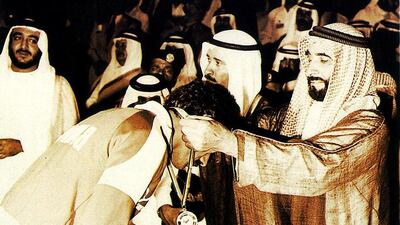For UAE football fans of a certain generation, it was a moment that defined an era.
Fahad Khamees beat the offside trap, skipped past the Qatari goalkeeper and slotted the ball into the empty net to score the opening goal of the 1982 Gulf Cup of Nations, the first to be held in the UAE.
High up in the stands, Sheikh Zayed smiled.
In the days following the 1-0 victory, the goal was repeated almost non-stop on local TV. For good reason, too: success-starved fans could not get enough of it.
The UAE finally had a team that promised a brighter future after years of being the region’s whipping boys. Zayed Sports City Stadium, completed less than two years earlier, had its first unforgettable moment, and a new Emirati star was born.
The future, fleetingly, looked bright.
Ultimately, the UAE would not win the sixth edition of the Gulf Cup, nor did they perform exceptionally. Yet Khamees’s goal, and the week that followed it, allowed Emirati fans to dream, and instilled a sense of pride in the side that previously did not exist.
It was also a pivotal period for the country, less than 10 years since statehood had been achieved.
In May 1981, Sheikh Zayed bin Sultan, President of the UAE, had hosted the leaders of Saudi Arabia, Bahrain, Qatar, Kuwait and Oman at the Intercontinental Hotel in Abu Dhabi, a meeting which resulted in the six heads of states signing an economic agreement that formed the Gulf Cooperation Council.
The following March, the UAE once again was the centre of attention as the region’s biggest football tournament came to the country.
On the field, as much as off it, progress was rapid.
Under former England manager Don Revie, the 1979 Gulf Cup had been a disaster. The UAE were thrashed by Iraq (5-0), Kuwait (7-0) and Bahrain (3-0). Five defeats and a single win meant they finished sixth out of seven teams.
By 1982, the Iranian Heshmat Mohajerani had taken over, and the team had an opportunity to showcase progress in front of their own fans.
The victory against Qatar was followed by another 1-0 victory, against Saudi Arabia. The feel-good factor swept the nation. Emiratis had never before had the chance to back their team quite so vociferously.
Other heroes would emerge, particularly goalkeeper Saeed Salbukh and Salem Khalifa, who finished joint-top scorer with three goals.
Yet the unthinkable was not about to happen. Defeats to Kuwait (2-0), Bahrain (3-2) and Iraq (1-0) followed. The latter result was later annulled after the holders were ordered home, after playing four of a scheduled six matches, by Iraqi president Saddam Hussain.
At least, the UAE would end on a high, with a 3-1 win over Oman earning them a third-place finish.
But, by then, the euphoria of the opening-day ceremony and Khamees’s career-defining moment had faded, replaced by apathy that would afflict football fans in this country all too often over the next three decades.
Iraq’s withdrawal added to the sense of anti-climax, as Kuwait claimed the least-memorable of all their Gulf Cup triumphs.
For the hosts, the tournament was still the start of something special.
Little did fans realise that the UAE had taken the first steps on a very long road toward becoming one of the region’s finest teams.
In 1984, Sheikh Hamdan bin Zayed, the new president of the Football Association, adopted a Brazilian playing ideology for the rest of the decade. The reigns of Carlos Alberto Parreira and Mario Zagallo would go on to play a huge part in Emirati football history.
The influence of Mohajerani, especially in Abu Dhabi in 1982, should not be under-appreciated. He steadied a rocking ship and transformed results in his time as coach.
For Khamees, the story would have a fairy-tale ending. Eight years later, the Al Wasl player helped the UAE record their finest football achievement – qualifying for the 1990 World Cup finals in Italy.
akhaled@thenational.ae
Follow us on Twitter at SprtNationalUAE

